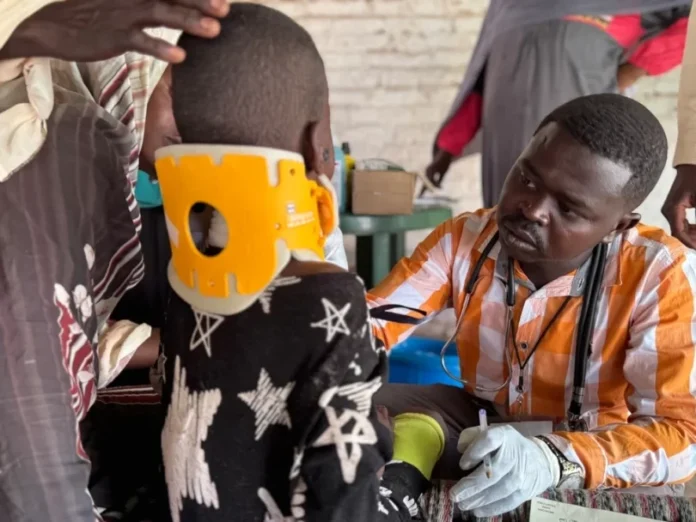Doctors Without Borders (MSF) has announced an outbreak of measles and severe acute malnutrition among people displaced from Zamzam camp and El Fasher to the Tawila area.
In the same context, the Federal Ministry of Health reported a rise in measles cases, with 138 cases recorded last week across three states: North Darfur (among displaced people in Tawila locality), River Nile, and White Nile.
The number of people fleeing from El Fasher and its surroundings to Tawila and other areas has increased following the Rapid Support Forces’ (RSF) takeover of Zamzam camp and intensified attacks on El Fasher.
According to a report by MSF relayed by Radio Dabanga, the surge in suspected measles cases has put additional pressure on the hospital MSF runs in Tawila. Since early February, MSF has treated over 900 suspected measles cases in Tawila, including more than 300 critical cases that required hospitalization. In response, a large-scale vaccination campaign was launched in the first week of April, targeting 18,000 children under five.
MSF also reported a sharp increase in admissions to its intensive therapeutic feeding center, which treats children under five suffering from severe acute malnutrition. Admissions nearly tenfolded, reaching over 60 per week, with most cases among children from Zamzam camp.
The organization warned that malnutrition and measles, especially in densely populated areas with poor hygiene, form a deadly combination for children.
MSF is scaling up its long-term intervention: it has provided dry food to community kitchens, enabling the preparation and distribution of over 16,000 meals daily, supplied 100,000 liters of clean water each day, and plans to build 300 latrines.
Despite efforts by other organizations and an initial large-scale food distribution, humanitarian needs remain immense and far exceed MSF’s capacity to respond. MSF noted that while many organizations are present in the area, the number of people in need far surpasses available support. Two health centers established by MSF teams in key locations provide water, medical, and nutritional care, and refer critical cases to the local hospital, which MSF has supported since October 2024.
On April 12, MSF’s emergency department saw a major influx of critical patients. According to MSF’s head nurse, Tiphenn Salmon, “During the first days, the number of patients nearly doubled. Sometimes, we had four patients in one bed. Many had gunshot and blast injuries.” MSF teams treated 779 patients-including 138 children-in the past three weeks. “The youngest was a seven-month-old baby with a bullet wound under his chin and into his shoulder. We also received patients as young as one day old suffering from dehydration. Many children arrived without their parents, and many parents were desperately searching for their children.”
The Federal Ministry of Health also announced a decline in cholera and dengue fever cases in all reported states except Khartoum. However, the ministry’s report to the Federal Emergency Operations Center confirmed the increase in measles cases, with 138 cases in three states-North Darfur (among displaced people in Tawila), River Nile, and White Nile-last week.
The report also noted that around 12,000 people voluntarily returned through the Ashkeet and Argeen crossings last week.
Federal Health Minister Dr. Haitham Mohamed Ibrahim called for intensified efforts, especially in Khartoum, noting that the diphtheria outbreak requires more work and coordination with organizations. The Khartoum health ministry reported a significant decline in cholera cases in Jebel Awlia locality.


